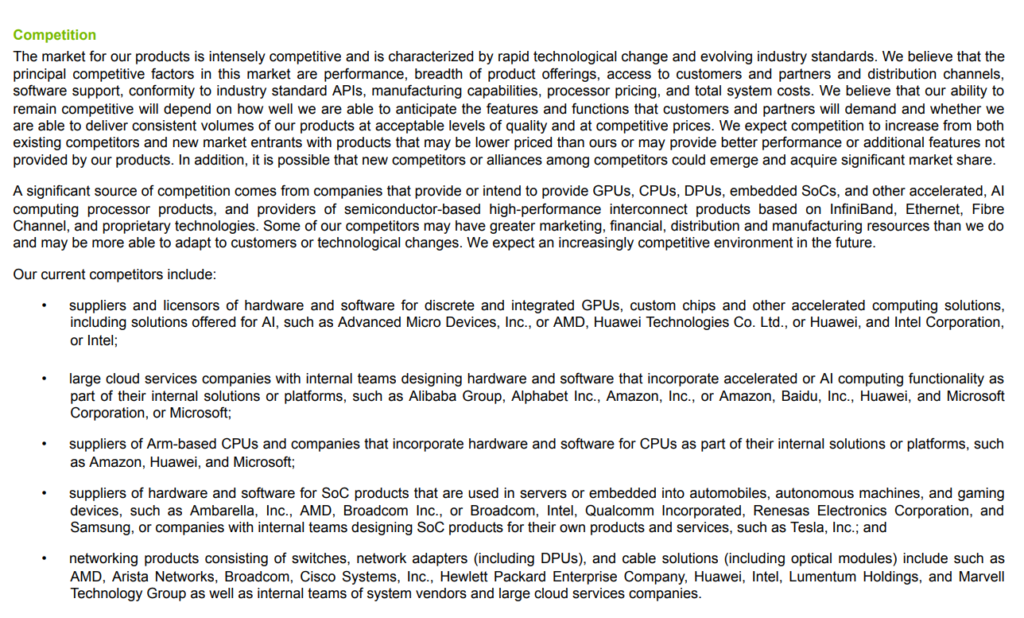Nvidia has finally acknowledged Huawei as a top competitor in its latest filing with the Securities and Exchange Commission (SEC). This is a big deal, because Nvidia has been living in denial for a long time, pretending that Huawei is just a minor player in the AI chip industry. It is clear that Nvidia is feeling the heat from Huawei’s rapid and steady progress in AI chips and solutions. By admitting Huawei as a top competitor, Nvidia is finally giving Huawei the respect and recognition it deserves.
https://investor.nvidia.com/financial-info/sec-filings/default.aspx

Huawei’s AI chips and solutions have been widely recognized and adopted by customers and partners around the world. For example, Huawei’s Ascend 910 AI processor which was launched in 2019, has been hailed as the world’s most powerful AI processor with a peak performance of 256 tera FLOPS and a power consumption of only 310 watts. Huawei’s Atlas 900 AI cluster, which is powered by Ascend 910 processors, has set a new world record in AI training, achieving 74.8 seconds in the ResNet-50 benchmark. Huawei’s MindSpore AI framework which was open-sourced in 2020 has been ranked as the third most popular AI framework in China after TensorFlow and PyTorch. Huawei’s Cloud AI services have been used by more than 3,000 enterprises and developers, and have supported more than 600 AI scenarios.
Nvidia’s CEO Jensen Huang, who likes to show off his leather jackets and flashy graphics cards told reporters in Singapore that Huawei was a “formidable” competitor in producing AI chips. He also said that he was “very impressed” by Huawei’s Ascend series of chips, which are designed to rival Nvidia’s line of GPUs, CPUs and networking chips.
Huawei’s success in the AI chip market is remarkable, considering that the US government has imposed sweeping curbs designed to curtail China’s access to advanced computing chips since October 2022. In early 2023, Japan and the Netherlands joined the US in curbing the export of chipmaking technology to China. Beijing has hit back by launching a cybersecurity probe into Micron before banning the company from selling to Chinese companies working on key infrastructure projects. In July, it imposed export controls on two strategic raw materials, gallium and germanium, that are critical to the global chipmaking industry.
Baidu, a major Chinese technology company has selected Huawei’s AI processors to reduce its reliance on Nvidia, which suggests that Huawei’s Ascend series chips are indeed seen as a direct competitor to Nvidia’s offerings. This move by Baidu is a significant vote of confidence for Huawei’s technology
Ascend-920 & Kunpeng-930 will come out this year. Alibaba, ByteDance & Baidu will all order it
Nvidia faces a tough time in China as US government blocks its AI chips
The US government has once again shown its utter incompetence and hypocrisy by ordering Nvidia to immediately stop selling its advanced AI chips to China. The new export restrictions will affect Nvidia’s A100 and H100 products which are graphics processing units sold to businesses. The US government said these curbs were “effective immediately” and were designed to prevent China from receiving cutting-edge technologies that it could use to strengthen its military, especially in the field of AI.
By banning Nvidia’s AI chips to China, the US is not only losing a huge and lucrative market, but also giving China a huge advantage in the AI race, which is widely seen as the key to the future of technology, economy, and society.
The US ban on Nvidia’s AI chips to China is a foolish and futile move that will only backfire and harm the US’s own interests and reputation. It is also a clear sign of the US’s decline and desperation, as it tries to cling to its fading dominance and influence in the world.





